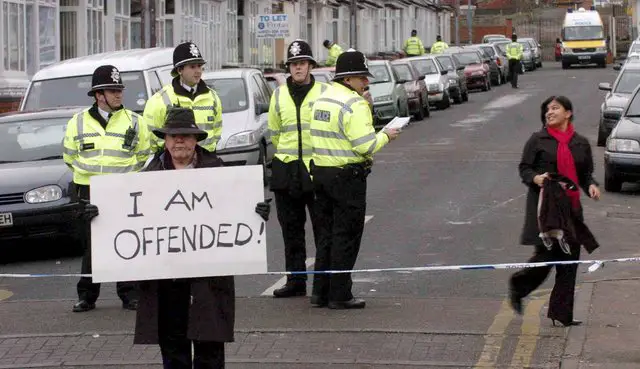It seems that most people in today’s world are offended by something, whether it be something political, the theater or even a schoolbook.
People who inhabit social media are an especially great example. Facebook, Instagram, Twitter — these platforms are laden with people attempting to find an issue with something that does not exist. However, the subject of sensitivity is difficult to tackle, because what makes anyone the judge of what you can or cannot be sensitive about?
Here is the thing: Sensitivity, if given a suitable reason, is understandable and easy enough to accept.
For example, before films with explicit content, such as a rape or suicide, a scene that might trigger an individual due to a past incident in their life is a logical explanation for being sensitive about a certain film. It is a completely different thing to protest the showing of a movie because you specifically are offended by it and its contents, no matter the important lessons it aims to teach.
This is true for even children and young adult literature. Many renowned authors who have written the most excellent and inspiring books filled with exceptional themes, lovable characters and a captivating plot have their best-selling books banned from schools due to their graphic text and mature themes.
“The Absolutely True Diary of a Wimpy Kid” by Sherman Alexander was banned for explicit language and racial terminology. “Bridge to Terabithia” by Katherine Paterson was banned for crude language and controversial religious ideas. “The Catcher in the Rye” by J.D. Salinger was banned for crude language, sexual connotations and common teenage disobediences.
All of these classic novels have reshaped the American imagination, but were banned because of their content. If students cannot learn, through school-assigned literature, these valuable lessons that might move them in positive ways, how else will they learn them?
Certainly not in entertainment, as theater is also chastised for being too honest. In February 2017, the actors of “Hamilton” were caught in a sea of controversy after a cast member singled-out Vice President Mike Pence, who was attending as a member of the audience, by addressing the politician and saying that he hoped the show had moved the conservative policymaker to protect America’s diversity. Needless to say, President Trump did not take too kindly to this innocent message.
“Harassment” was the word used by the president in a tweet. It had been “rude” for the cast member to earnestly express to the “great” vice president, Mike Pence, the importance of diversity in America, and that the theater must always be a safe and special place.
Theater must always be a safe and special place, Mr. Trump? Theater? The art in which dramatic performers act with flair to express what are oftentimes unbelievable stories? Where playwrights are free to compose the most magnificent scripts that may contain the juiciest topics of today, from race to politics, homosexuality, gentrification and suicide?
Art is a form of expression. Though everyone would like to be safe, life is not filled with seat belts or helmets or knee pads. There are bumps and gashes that everyone must tough through, and when you suffer them, you learn and you feel—that is the point of not only theater, but all of entertainment.
(And no, it was not wrong what the “Hamilton” cast member did. #StopBeingSensitive2017.)
While we’re on the topic of the president, let’s move on to political correctness. It seems that everyone and their mother is being politically correct, and it is totally aggravating. Nowadays it seems that anyone if goes against a popular opinion, they are the enemy.
Say a person leans neither right nor left; rather, they are someone who has views from both sides, taking a moderate stance on many important issues, such as abortion, gay marriage, immigration policy and education. No matter one’s belief, there will always be someone there to counter their stance, thus putting them in the position of being insulted for believing their own ideas.
I’m sorry, but whatever happened to freedom of speech? Are people not allowed to have a difference of opinion? Now, as I said earlier, if someone is offended by what one person has said, a respectful conversation should ensue as to why that is. Otherwise, disparaging someone’s opinions because they do not match your own is unfair, rude and distasteful.
Oversensitivity is a sentiment that most people run into regularly nowadays, especially on social media, and this hypersensitive mindset is good for nothing but resentment and anger. Calm down, recognize that everyone has different beliefs and stop getting so upset about nothing.














